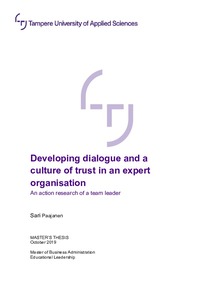Developing dialogue and a culture of trust in an expert organisation
Paajanen, Sari (2019)
Paajanen, Sari
2019
All rights reserved. This publication is copyrighted. You may download, display and print it for Your own personal use. Commercial use is prohibited.
Julkaisun pysyvä osoite on
https://urn.fi/URN:NBN:fi:amk-2019111020887
https://urn.fi/URN:NBN:fi:amk-2019111020887
Tiivistelmä
This action research focused on the organisational culture change process inside an expert team of eight members. It investigated how to rebuild and reinforce a culture of trust and open dialogue between the team and the management. The context and the relevance of the research topic arose both, from the requirements of the management, and the new operating circumstances.
The research question was How to develop dialogue and culture of trust in an expert organisation? The theoretical frame offers usable ideas and tools for the regeneration of trust and change process. The chosen empirical action research strategy and process offered answers and solution alternatives to the problem by using an integration of multiple qualitative and quantitative research methods. These were suitable for practical problems and analyses and improvements to implement in the team.
The research included two mixed method anonymous web surveys with an open and closed questionnaire. Semi-structured theme interviews were conducted in the team. The author’s diary and memoranda were also included to the research data. The final themes and interventions for change originated from the participants. The interventions were carried out in close co-operation with the team. The author concentrated on solving the two main obstacles: the lack of open dialogue in communication and the lack of internal trust.
During the six-month research and development process both openness (open dialogue and co-operation) and trust increased (+29% and +28%, respectively) between team members and management. For example, co-operation and trust were fostered by offering more possibilities to work together in collective material preparing, meeting colleagues, and executing more demanding tasks. The team leader purposefully orchestrated more win-win situations for the team and management. Attention was also paid to avoidance of personal stress and micromanagement culture.
The research is partly adaptable to expert organisations having a need to reshape an organisation culture of authoritarian management style towards 21st century market and co-operative expert culture
The research question was How to develop dialogue and culture of trust in an expert organisation? The theoretical frame offers usable ideas and tools for the regeneration of trust and change process. The chosen empirical action research strategy and process offered answers and solution alternatives to the problem by using an integration of multiple qualitative and quantitative research methods. These were suitable for practical problems and analyses and improvements to implement in the team.
The research included two mixed method anonymous web surveys with an open and closed questionnaire. Semi-structured theme interviews were conducted in the team. The author’s diary and memoranda were also included to the research data. The final themes and interventions for change originated from the participants. The interventions were carried out in close co-operation with the team. The author concentrated on solving the two main obstacles: the lack of open dialogue in communication and the lack of internal trust.
During the six-month research and development process both openness (open dialogue and co-operation) and trust increased (+29% and +28%, respectively) between team members and management. For example, co-operation and trust were fostered by offering more possibilities to work together in collective material preparing, meeting colleagues, and executing more demanding tasks. The team leader purposefully orchestrated more win-win situations for the team and management. Attention was also paid to avoidance of personal stress and micromanagement culture.
The research is partly adaptable to expert organisations having a need to reshape an organisation culture of authoritarian management style towards 21st century market and co-operative expert culture
